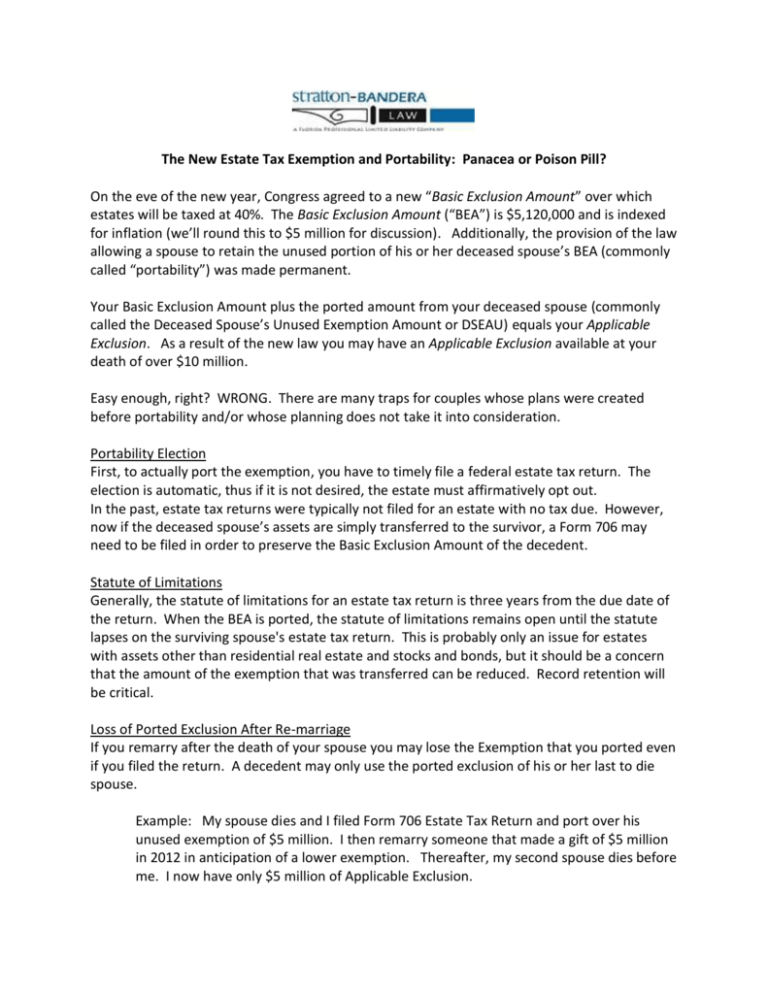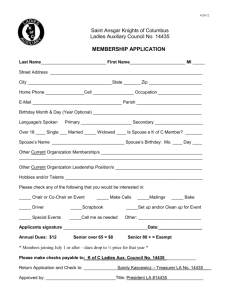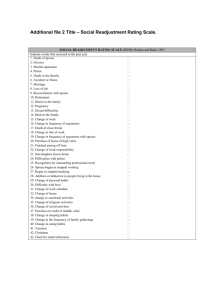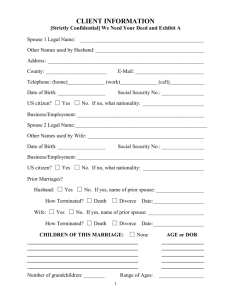The New Estate Tax Exemption and Portability: Panacea or Poison
advertisement

The New Estate Tax Exemption and Portability: Panacea or Poison Pill? On the eve of the new year, Congress agreed to a new “Basic Exclusion Amount” over which estates will be taxed at 40%. The Basic Exclusion Amount (“BEA”) is $5,120,000 and is indexed for inflation (we’ll round this to $5 million for discussion). Additionally, the provision of the law allowing a spouse to retain the unused portion of his or her deceased spouse’s BEA (commonly called “portability”) was made permanent. Your Basic Exclusion Amount plus the ported amount from your deceased spouse (commonly called the Deceased Spouse’s Unused Exemption Amount or DSEAU) equals your Applicable Exclusion. As a result of the new law you may have an Applicable Exclusion available at your death of over $10 million. Easy enough, right? WRONG. There are many traps for couples whose plans were created before portability and/or whose planning does not take it into consideration. Portability Election First, to actually port the exemption, you have to timely file a federal estate tax return. The election is automatic, thus if it is not desired, the estate must affirmatively opt out. In the past, estate tax returns were typically not filed for an estate with no tax due. However, now if the deceased spouse’s assets are simply transferred to the survivor, a Form 706 may need to be filed in order to preserve the Basic Exclusion Amount of the decedent. Statute of Limitations Generally, the statute of limitations for an estate tax return is three years from the due date of the return. When the BEA is ported, the statute of limitations remains open until the statute lapses on the surviving spouse's estate tax return. This is probably only an issue for estates with assets other than residential real estate and stocks and bonds, but it should be a concern that the amount of the exemption that was transferred can be reduced. Record retention will be critical. Loss of Ported Exclusion After Re-marriage If you remarry after the death of your spouse you may lose the Exemption that you ported even if you filed the return. A decedent may only use the ported exclusion of his or her last to die spouse. Example: My spouse dies and I filed Form 706 Estate Tax Return and port over his unused exemption of $5 million. I then remarry someone that made a gift of $5 million in 2012 in anticipation of a lower exemption. Thereafter, my second spouse dies before me. I now have only $5 million of Applicable Exclusion. The Power to Make the Portability Election The Executor of the decedent is the party responsible for filing the federal estate tax return. The Executor faces no tax liability or IRS penalty for failing to timely file where there is no tax due. What is not clear is the responsibility of the Executor to the surviving spouse. If they are not one and the same there could be disagreement over whether a return should be filed. This is especially important for blended families and may need to be addressed in a pre or post marital agreement. Another consideration for discussion between spouses and marital agreements will be the effect of lifetime gifts on the Basic Exemption Amount. Generation Skipping Tax Exemption The generation skipping tax exemption is not portable. Even if a Form 706 is filed, the maximum generation skipping tax exemption available to a surviving spouse’s estate is $5 million. State Inheritance Taxes Portability applies to the federal basic exclusion amount; it does not apply to state inheritance taxes. Inflation Your personal Basic Exclusion Amount is indexed for inflation. However, the amount ported from a deceased spouse is not. Thus, if the deceased spouse’s property appreciates in the lifetime of the surviving spouse, not all will transfer free of estate taxes. The Planner’s Responsibility In order to protect both the advisor and the client, every client must be educated about the pitfalls of the estate tax exemption rules. Among other things, each client should be encouraged to enter into a Pre or Post Marital Agreement that includes this issue and to consider filing a Form 706 upon the death of a spouse. If a client declines either the planner should obtain a signed statement. Whichever direction a client chooses, record keeping is vital for both their protection and the planner’s. Bypass Planning Bypass planning may remain desirable even for non-taxable estates. A bypass trust provides the following: Protection from the Remarriage Penalty (loss of the ported exemption) Protection from a Second Spouse’s Elective Share Rights Creditor Protection Through a Spendthrift Bypass trust Protection from Failure to File Form 706 Inflation Protection Conclusion Although portability may be a boon for older married couples with estates made up of assets such as retirement accounts, personal residences and qualified annuities whose transfer has income tax consequences which made bypass trusts undesirable, it contains many traps and potential unintended consequences for the uneducated. Everyone should consult with their tax and legal advisors to determine how it affects their plan. Note to Florida residents In addition to the recent changes in the federal estate tax law, amendments to the income tax regulations that affect your retirement accounts and the enactment of the Health Insurance Privacy and Portability Act, there have been many changes in Florida law that may affect your estate plan. These include an overhaul of the durable power of attorney statute and the homestead exemption. ABOUT THE AUTHOR 611 West Azeele Street Old Hyde Park Tampa, FL 33606 813-251-1624 www.stratton-bandera.com Janet Bandera, JD is admitted to practice law in Florida, Illinois and Missouri and has been working with families and business owners since 1995, helping them preserve their legacy through wills and trusts as well as business succession planning. Janet is a nationally recognized attorney, author, lecturer and teacher and has been designated as AV Preeminent® by MartindaleHubbell®, a designation given to less than 5% of women lawyers. Her clients declared her a 5 Star Wealth Manager® in 2011 and 2012. Stratton-Bandera Law provides estate and business planning from start up to succession.






